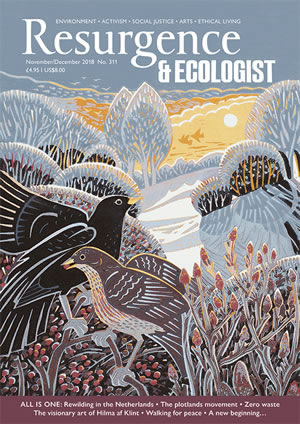Will McCallum, Head of Oceans at Greenpeace UK, has written a compelling and accessible short book on the world’s plastics crisis and ways to resolve it. Unlike some environmental books, in which what people can do comes as something of an afterthought, the primary focus here is on individual responsibility. In a series of detailed, enjoyable and avowedly unpreachy chapters, the author takes readers on a virtual plastic tour through bathroom, kitchen, baby’s nursery and day-to-day life to provide a comprehensive ‘detox’ – my word, not his – plan for them to follow. In addition to exploring personal responsibility in individual consumption choices, the book is also an inspiring ‘back to basics’ guide to engaging in community activism and influencing decision makers to act. The chapters here cover the art of writing a good (and courteous) letter to an MP or to the CEO of a multinational, how to organise and/or participate in a beach clean-up, and how to use social media to devastating effect (such as the individual who successfully called out the ludicrous ‘cauliflower steak’ wrapped in plastic and sold at M&S, which was hastily withdrawn thereafter).
Fundamentally, the message appears to be that the time for hand-wringing is over: no single action is futile, we are all part of this problem to a lesser or greater extent, and so we must all act to address it. While we may mourn the amount of plastic already in the ocean, blighting the lives of so many creatures in the marine environment and ruining some of the coastline that we hold most dear, it is not enough to wallow in pity and regret. We are all responsible; we must all act. How refreshing, then, to read through a book overwhelmingly devoted to that action and the many different ways it might be carried out. There is an ethical value in doing everything we can, irrespective of the scale of the challenge: even one plastic straw saved from landfill and the ocean, the message seems to be, is worth the effort.
Many readers of Resurgence & Ecologist will already practise a number of the ideas put forward in the book, whether by using washable nappies, eschewing non-reusable coffee cups, or planning meals in advance to avoid the tyranny of take-away salad, yoghurt pots and (my personal bêtes noires) plastic cutlery and water bottles. But, for many people who until Blue Planet II and Sky Ocean Rescue did not give the matter much thought, the range of suggestions so methodically set out will be an essential primer. McCallum takes care to avoid a ‘holier-than-thou’ posture too, as do the series of interviewees whose insights pepper the book: there is no sententious ascetism here, but rather an enabling ‘can-do’ attitude.
My one reservation about the book is that I missed more detailed treatment of the ‘political economy’ of reforming and ultimately doing away with so much of the world’s plastic: while hypocritical and all-powerful companies come in for a fair amount of (legitimate) flak, and a number of countries’ pioneering plastic bag bans are rightly praised, I was left wondering what more could be done by governments and the international community to regulate and enforce a different approach to plastic in the century ahead. But perhaps the answer in the book is that the solutions are glaringly obvious: we just need people to act, and to clamour for action, to bring them about. The book shows how – in no uncertain terms. I hope a copy has landed on every world leader’s desk, and every CEO’s too.






